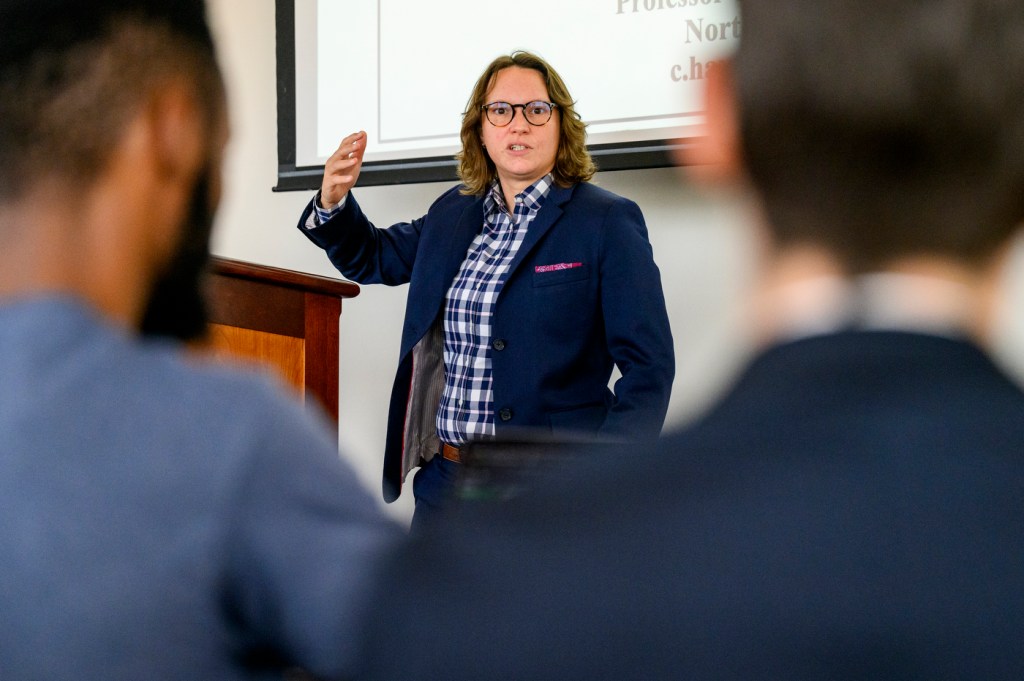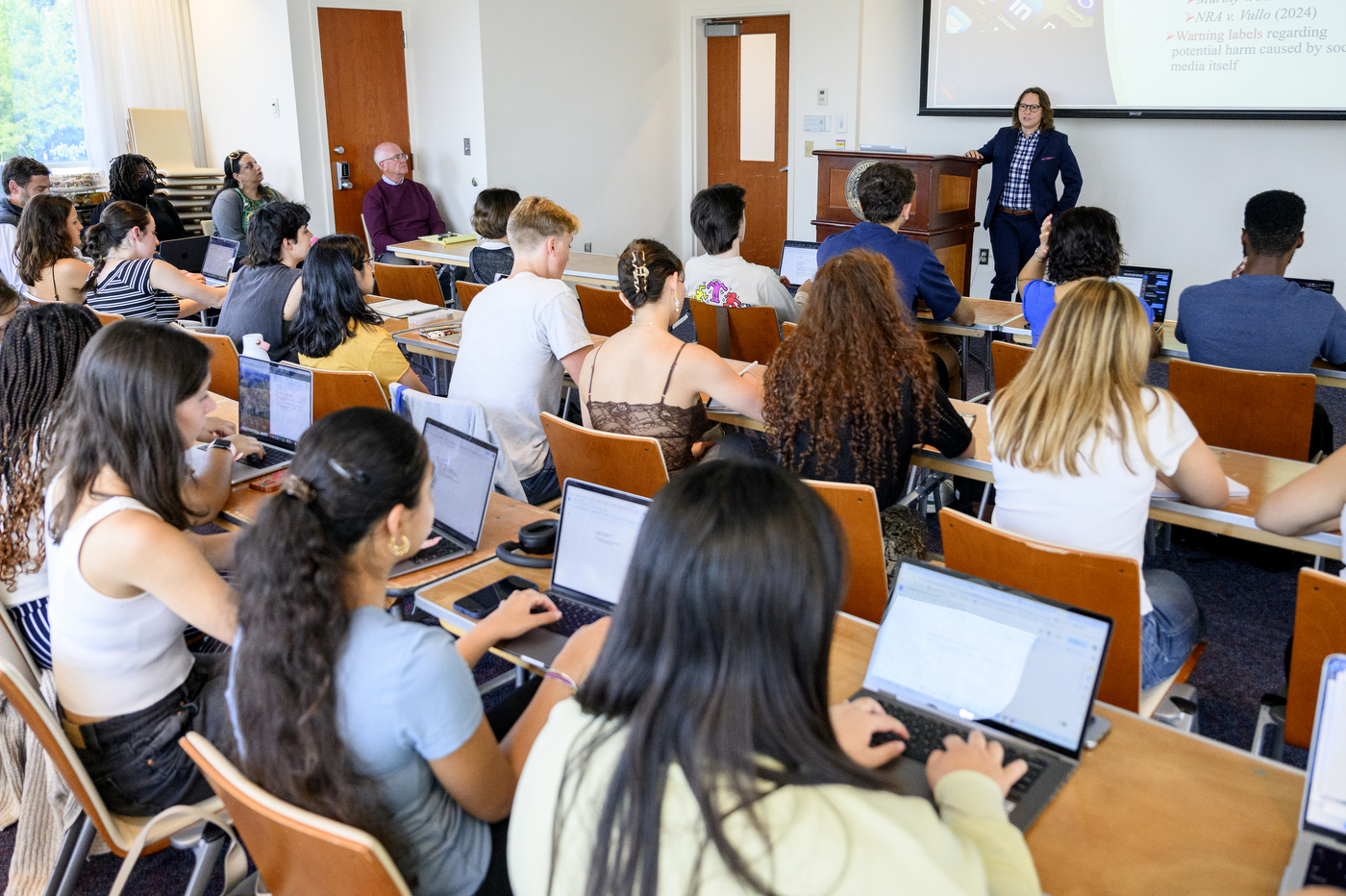Constitution Day lecture dives into the muddy reality of free speech, public health and the First Amendment
This year’s Constitution Day lecture focused on the intersection of free speech, the First Amendment and public health, an area of law humming with activity.

“You are not a horse. You are not a cow. Seriously, y’all. Stop it.”
That may not read like expert advice, but those sentences were what the U.S. Food and Drug Administration tweeted in 2021 in an effort to combat misinformation surrounding the use of the drug ivermectin, an antiparasitic agent, at the height of the COVID-19 pandemic.
The FDA subsequently took down this and other social media posts after it was sued by a group of doctors who claimed they were harmed by the agency’s campaign to clarify the drug’s use, saying that it interfered with their ability to prescribe and damaged their reputations.
The episode is one illustration of just how slippery the terrain of “professional speech” has become in the social media age.
That was the subject of this year’s Constitution Day lecture, delivered by Claudia E. Haupt, a Northeastern University professor of law and political science and a First Amendment expert. Her talk looked at the intersection of free speech, the First Amendment and public health, an area of law humming with activity.


As she sees it, there are three examples that illustrate the clash between public health and free speech: “the rapid spread of health mis- and disinformation on social media; the extent to which public health officials can influence social media’s role in spreading potentially harmful health advice to the public; and, finally, the harmful effect of social media itself, and what the government may do about it.”
Haupt began the talk by considering the speech constraints placed on today’s medical professionals. There are legal limits that describe and give shape to the relationship between a doctor and a patient. The doctor-patient relationship is circumscribed by, among other things, professional licensing, the informed consent doctrine, tort liabilities and fiduciary duties.
“All of those legal limits around the speech of professionals exist so that we can rely on the advice that the professional gives,” Haupt says.
“And they’re all, to some degree, problematic from a free speech point of view,” she continues. “If we did this anywhere outside of the professional context, it would look like an infringement on free speech.”
Editor’s Picks
But it’s the special nature of the relationship between the professional and the client — here, the doctor and the patient — that keeps those legal prescriptions from running afoul of the First Amendment. “These legal limits are OK as long as the underlying relationship is one between a professional and a client,” Haupt says.
Speech limits in the doctor’s office is one thing. But what about when a physician takes to social media to express their views about certain therapies, as, for example, Dr. Mehmet Oz had done during the COVID-19 pandemic?
“Now they’re not talking to the patient, but to millions of people,” Haupt says.
Dr. Oz touted the use of hydroxychloroquine, a malaria drug that — together with ivermectin — was the source of misinformation and controversy, as a treatment for COVID-19. Health authorities have not recommended the drug as a treatment for COVID-19, noting also that it doesn’t prevent infection. (Dr. Oz’s links to the company that makes the drug is a separate story — and conflict — altogether.)
The law clearly prohibits doctors from giving “bad advice” in a one-on-one setting. But the dissemination of such advice over social media, where it might be seen by potentially millions of users, is protected speech.
It’s what Haupt refers to as the “Dr. Oz paradox.”
What accounts for this asymmetry? Haupt says the First Amendment distinguishes “pretty sharply” between what happens within a professional relationship, and what happens outside it, when a professional is speaking as a private person.
What can sometimes result, as in the case with Dr. Oz, is what Haupt refers to as “pseudo-professional advice.” While the American Medical Association offers ethical guidelines for physicians who may be inclined to provide health information on social media, Haupt notes that the “quality of advice is not secured by the same legal guardrails as advice within the doctor-patient relationship.”
“The underlying idea is that everyone is equal in public discourse,” she says. “We can call the things that are not within the professional relationship itself the discussion of ideas in general; and when we’re talking about the discussion of ideas in general — as frequently happens on social media — we don’t have malpractice liability, and we don’t have the same ideas about content and viewpoint regulation that we have within the professional relationship.”
Add in speech by government officials, and things can get even murkier. Haupt says there are essentially no First Amendment restrictions on government speech.
“The government can basically choose its own message,” Haupt says. “Nobody says that the government has to be anti-smoking or anti-obesity. The government can pick and choose its own message, without any First Amendment limits to what the government can say.”
But there are some gray areas with respect to experts who act as government advisers, or legislators who are also professionals.
The question often becomes: which hat are they wearing when they are giving advice on matters of public health?
For example, the statement, “Masks are bad for liberty,” is, according to Haupt, “a perfectly fine political statement” that doesn’t claim to have any expertise. That is, unless the addressee interprets the statement as inflected with expertise, if uttered by a government official who is also a professional.
“These are really interesting questions that can be really problematic as a matter of social media regulation,” Haupt says.











